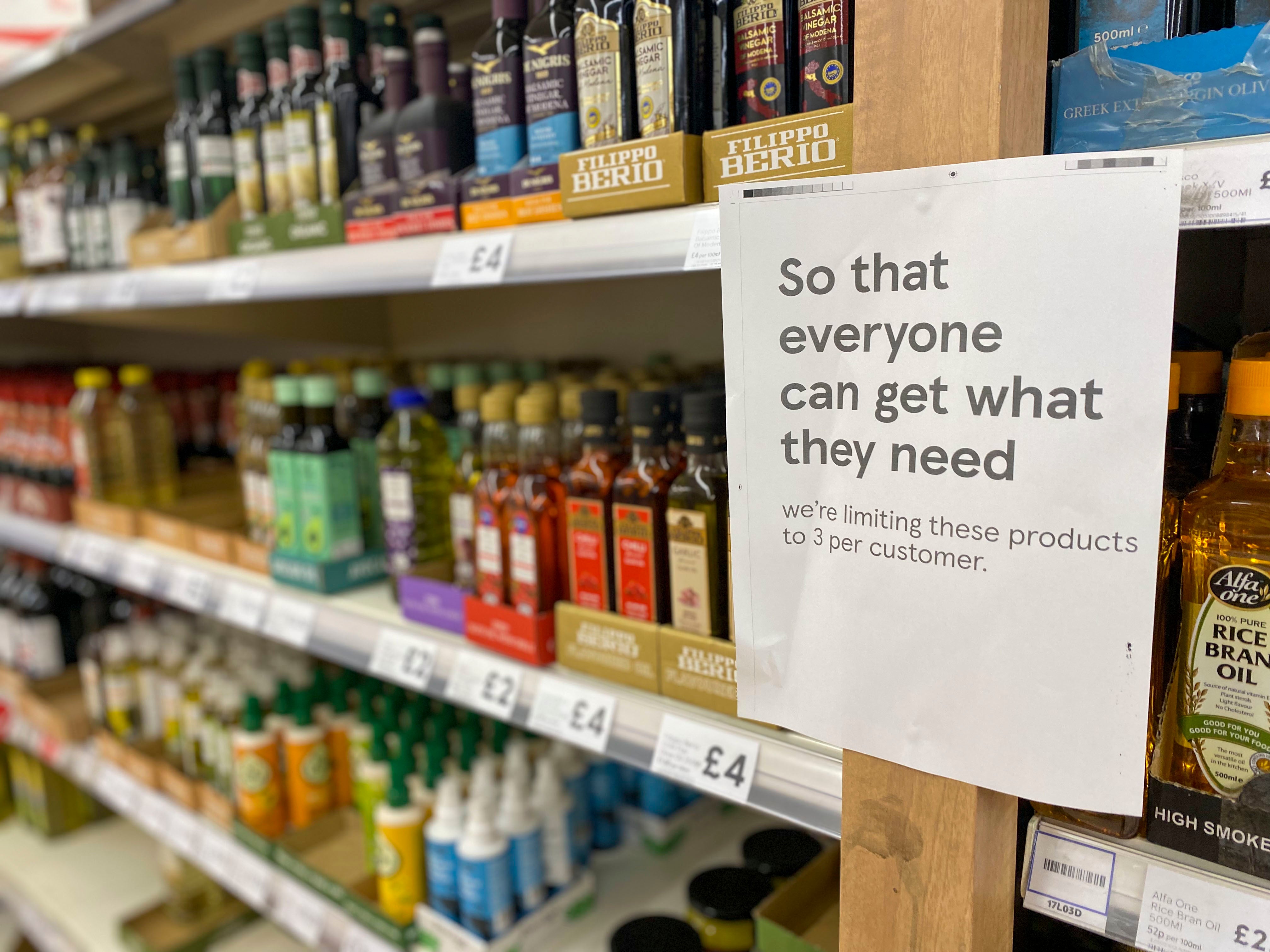Think cooking oil rationing is bad? I’m afraid things are about to get much worse
The longer the war in Ukraine continues, the greater the disruption and the greater the danger of famine, writes Hamish McRae


Quite suddenly a sign of a massive global problem has come to British supermarkets. They have started to ration cooking oil.
The problem is that supplies of sunflower oil have become disrupted because of the war in Ukraine, for it is the world’s largest exporter, producing more than half the world’s total. And number two is Russia. There are other producers, including the Netherlands, and other oils we can use, including rapeseed oil – all those yellow fields around the UK. But this is just one early visible example of a much wider and horrible matter.
It is that the world’s food supplies are going to be very tight. The longer the war continues, the greater the disruption and the greater the danger of famine. For this is not simply a matter of sunflower oil, or wheat, or any of the other food products where Russia and Ukraine are big producers. The greater problem is not specific shortages of individual foods, but rather the general shortage of fertilisers. This year’s crops are not so seriously affected, for much has already been planted. But next year and the year beyond could be dreadful.
Since early 2020 the price of the nitrogen-based fertilisers have quadrupled and the price of phosphate and potash have tripled. The FAO, the Food and Agriculture Organisation of the United Nations, has summarised the scale of the problem and notes that last year Russia was the world’s largest exporter of nitrogen fertilisers and the second largest of both potassium and phosphate fertilisers (the Fertiliser Institute has a clear explanation of these three main three fertilisers here).
So what will happen? The honest answer is that we cannot know, but we can be certain of one thing. The longer the war in Ukraine continues the greater the danger. The Oxford economic and political consultants, Eurointelligence, argue that this is most likely to be a creeping disaster rather than a sudden catastrophe. The German newspaper Die Welt has examined the global supply chain of fertilisers and carries the warning that the world faces “one of the greatest famines in human history”.
If that were indeed to happen, and I think the key point here is that the longer the war continues, the greater the danger. It would be the poor who would be most likely to suffer. Within the developed world there are, or at least should be, ways of making sure that people don’t starve. There are the resources and organisational capacity to cope. There is some time to plan and the challenge will be how best to make sure that the most vulnerable people are protected. We should not be over-confident, given how badly we are coping with the challenge of soaring energy prices, and protecting the most vulnerable on that score. Already food banks in the UK are under great pressure, as we reported earlier this month.
If a developed country is starting to struggle, how much worse it will be in the emerging world. It is not simply a matter of a lack of resources and administration to cope with this new threat. The underlying situation is much more serious. A few years ago the World Economic Forum produced a map showing how much of an average family budget was spent on food in different counties. In the US it was 6.4 per cent, in the UK 8.2 per cent – and in Nigeria 56.4 per cent.
To keep up to speed with all the latest opinions and comment sign up to our free weekly Voices Dispatches newsletter by clicking here
There are no easy fixes, but there are several things the developed world can do to reduce the risk the world faces. Other fertiliser producers should look at ways of increasing their output. We can reduce overall demand in the west by switching towards lower meat consumption, as making animal feed uses a lot of grain and edible oils. While it is true that a lot of the grain and other products that go into animal feed would not be suitable for humans, were there less demand for animal feed, other crops could be grown that would be suitable for us to eat. We may find that happens.
If there is a silver lining to these very dark clouds, it is that the shortage of fertilisers will make the developed world think much more about reducing waste in the food chain. We are making a start to try to curb the malign effect of sell-by and use-by dates. In the US, Harvard University reckons that 40 per cent of food is wasted.
Last week, the Co-op said it would end putting use-by dates on its own-brand yoghurt. But rebuilding the culture – familiar to anyone who can remember post-war rationing in the UK – that you never waste food, will be a long slog. But if we don’t, then we may find food rationing does indeed come back, and not just for sunflower oil.
Join our commenting forum
Join thought-provoking conversations, follow other Independent readers and see their replies
Comments
Bookmark popover
Removed from bookmarks